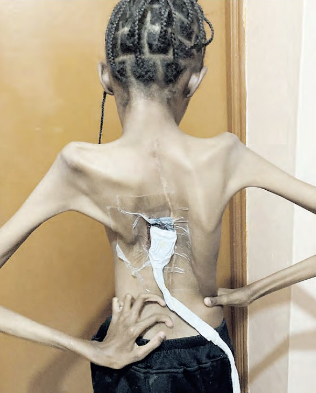

At 12, Nicolina should be in Grade 7 learning new ideas and grasping concepts, but nay, she is more accustomed to the sharp edges of the scalpel, blinding theatre lights and the fetidness of medicines. Hospitals, both at home and abroad, have become her second home.
The culprit–Marfan syndrome –has denied Nicolina the joy of childhood, the warmth of friendship with her agemates and freedom to pursue what life has in store for her.
Marfan syndrome is a rare genetic disorder that affects the body’s connective tissues that support organs, bones, muscles and other tissues.
Patients are often tall and thin, with long limbs, fingers and toes and degrees of curved spine.
The condition is so rare that by 2016, only 10 cases had been reported around the world.
Nicolina has now been out of school for two years after her condition worsened in early 2021. She was in Grade 3 then.
“Mum, why can’t I just die and relieve you of all this pain?” “When will I be well and live like other girls who go to school and do home chores?”
“Why doesn’t anybody else have this sickness?” These are some of the unsettling questions that Winnie Njoroge, her mother, has to field frequently. “How do you answer those questions?” Njoroge posed.
“Even though I’m a trained counsellor, I’m an emotional train wreck,” she told the Star.
Nicolina’s problems showed before birth, as she was unresponsive and with minimal movement.
After birth, she was frequently diagnosed with pneumonia and put on medication, until her mother and the doctors got curious to dig deeper.
The medical investigation found her spine was weak and bent 20 degrees and could not bear the weight of her body as she grew. As she continued to grow, the spine continued to curve, reaching 95 degrees in 2019.
This made her a candidate for surgical intervention.
To straighten out the spine, an iron rod, with adjustable joints, is inserted in the back.
The rod is adjusted periodically through surgical procedures to give room for the increasing height.
Njoroge put out a public appeal, including having stories published in the Star.
After a while, wellwishers helped raise the Sh2 million required and the surgery was done early this year in India.
Nicolina’s family hoped the surgery would give her a new lease of life. She, too, hoped to recover delayed milestones and be strong, enabling her to make new friends and go back to class, but not so.
During the healing process, the wound on her back began to itch. She scratched, opening a wound along the stitches and which quickly festered and started bleeding.
This meant another round of medical intervention and she has been to hospital many, many times.
“I thought it would be a simple thing but no, I was told the closing of the wound needs specialised attention quickly because the rod in her back can be corroded if it gets in contact with air.”
The doctor who attended to Nicolina in India advised she be flown back for surgery to repair the wound and avoid chances of the rod getting exposed.
Over Sh2 million is required and the family is once again appealing for help to raise the amount. Njoroge is distraught.
“Please help me so I don’t lose this faith. Please generously give to help me take my daughter back to the hospital and have her helped.”
The arduous journey of raising children with conditions has turned Njoroge’s life upside down, as her firstborn daughter was born epileptic.
Thanks to medical help, she leads a relatively normal life. Apart from being financially draining, caregiving has not been without another hefty downside – she lost her marriage.
“My husband was not patient... He was not supportive at all and I felt I had no future with him if the health of my kids was not a priority to him.”
Njoroge also has to put up with stigma, saying people shy away from associating with her “as they say my kids have strange illnesses that can infect their children”.
“Also, people just avoid me because they think that after I greet them, the next sentence would be about asking for money.”
To reach the mum, contact her on this number: 0724047277



